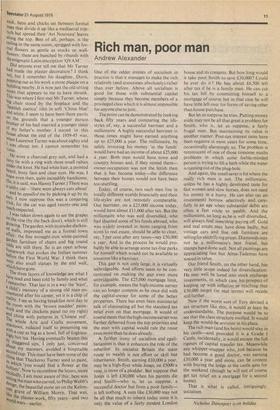Rich man, poor man
Andrew Alexander
One of the odder ironies of socialism in practice is that it manages to make the rich relatively (and sometimes absolutely) richer than ever before. Above all socialism is good for those with substantial capital simply because they become members of a privileged class which it is almost impossible tor anyone else to join.
The point can be demonstrated by looking back fifty years and comparing the lifestyles of, say, a successful barrister and a millionaire. A highly successful barrister in those times might have earned anything up to £25,000 a year. The millionaire, by safely investing his money 'in the funds' would have had an income of about £25,000 a year. Both men would have town and country houses and, if they rented themowner-occupation was not the fetish then that it has become today—the difference between their homes would not have been too startling.
Today, of course, two such men live in totally different worlds financially and their life-styles are not remotely comparable. Our barrister, on a £25,000 income today, would have about £11,000 after tax. But the millionaire who was well diversified, who had shunted some of his funds abroad, who was widely invested in items ranging from icons to real estate, should be able to clear, say, 5 per cent after any taxes—say £50,000 a year. And in the process he would probably be able to arrange some tax-free perks for himself which would not be available to someone like a barrister.
This gap is not only large, it is virtually unbridgeable. And efforts seem to be concentrated on ,making the gap even more unbridgeable. The £25,000 mortgage limit, for example, means the high-income earner can no longer compete as he once did with the capital-owner for some of the better properties. There has even been ministerial talk of eliminating all but the standard tax relief even on that mortgage. It would of coursel mean that the high-incomeearner was further debarred from the top priorities and the man with capital would rule the roost even more than he does already.
A further irony of socialism and egalitarianism is that it enhances the role of the inheritor. In socialist Britain the main route to wealth is not effort or skill but inheritance. Smith, earning £10,000 a year, may be a high-flyer while Jones, on £5000 a year, is more of a plodder. But suppose that Jones is left £30,000 when his parents die and Smith—who is, let us suppose, a successful doctor but from a poor family— is left nothing. A sum like £30,000 may not be all that much to inherit today since it is only the value of a fairly modest London house and its contents. But how long would it take poor_ Smith to save £30,000? Could he ever do it ? He has about £6,500 left after tax if he is a family man. He can cut his tax bill by committing himself to a mortgage of course but in that case he will have little left over for forms of saving other than house-purchase.
But let us suppose he tries. Putting money aside may not be all that great a problem for Smith, who is, let us suppose, a fairly frugal man. But maintaining its value is another matter. Post-tax interest rates have been negative in most years for some time, occasionally alarmingly so. The problem is reminiscent of one of those tiresome maths problems in which some feeble-minded person is trying to fill a bath while the water is running out of the plug-hole.
And again, the small saver is hit where the really rich man is not. The millionaire.
unless he has a highly developed taste for fast women and slow horses, does not need his money in a hurry. He can also (as an investment) borrow selectively and care fully in an age when substantial debts are often a fast route to wealth. And the millionaire, so long as he is well diversified.
will always find something paying off. Gold and real estate may have done badly, but vintage cars and fine oak furniture are selling for electrifying prices. Diamonds may not be a millionaire's best friend, but stamps have done well. Not all paintings are appreciating fast but Alma-Tademas have soared in value.
Our friend Smith, on the other hand, has very little scope indeed for diversification.
He may well be lured into stock exchange investments, in which case his prospect of keeping up with inflation or reaching that £30,000 target (in real terms) will recede still further.
Now if the worst sort of Tory devised a tax structure like this, it would at least be
understandable. The purpose would be to see that the class structure ossified. It would keep the would-be arriviste in his place. The rich man (and his heirs) would stay in his castle—and provided it is a Grade I
Castle, incidentally, it would escape the full rigours of capital transfer tax. Meanwhile any whipper-snapper who, just because he had become a good doctor, was earning £10,000 a year and more, can be content with buying the lodge at the castle gate for the weekend (though he will not of course get tax relief on a mortgage for a second home).
That is what is called, intriguingly. socialism.


































 Previous page
Previous page